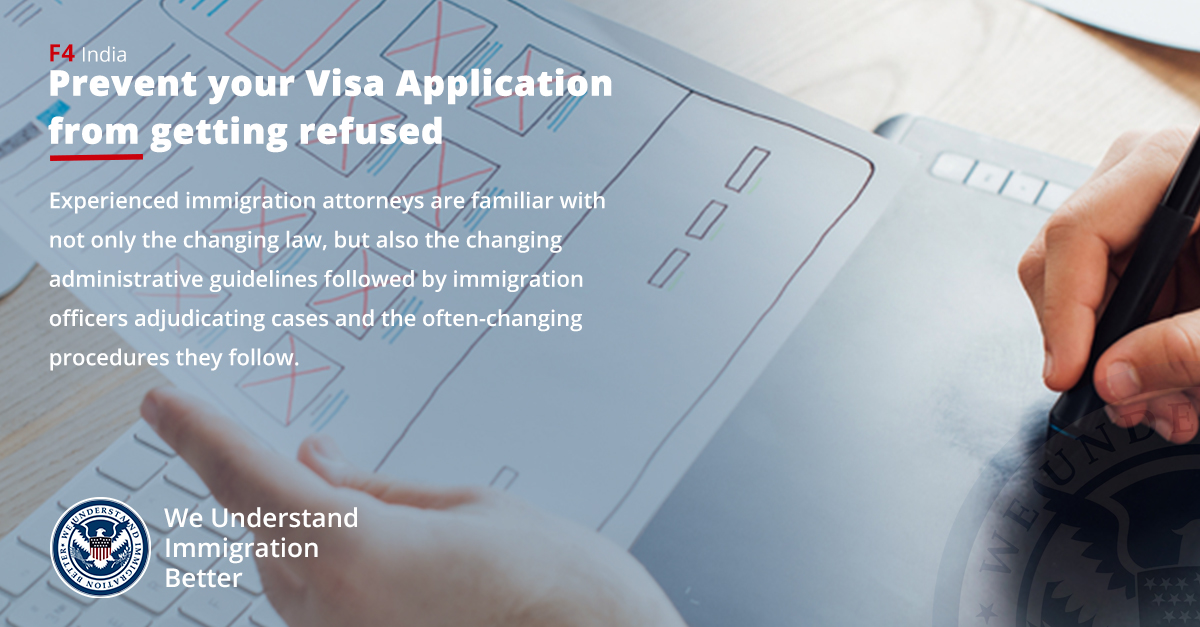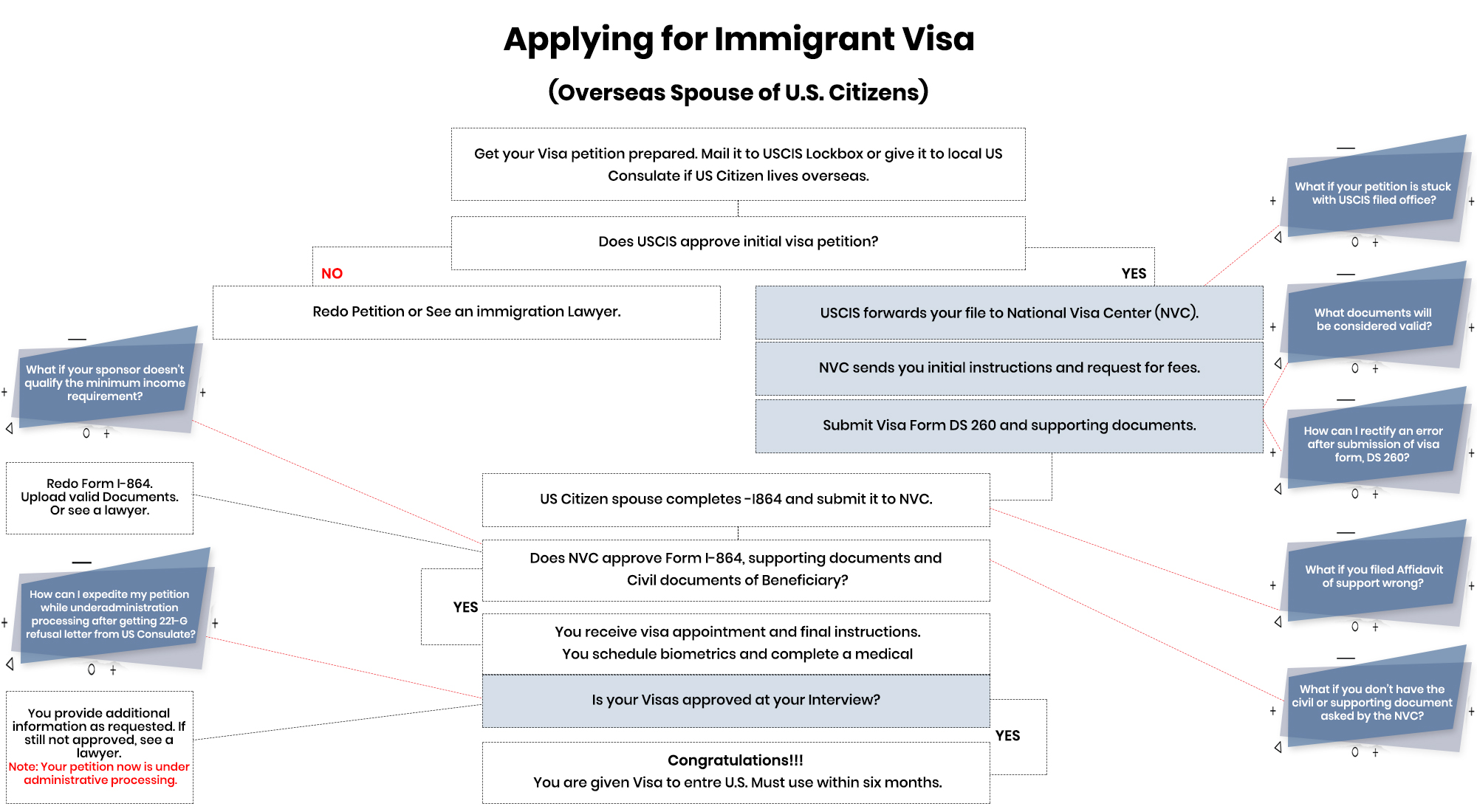My Application has Refused Under Immigration and Nationality Act (INA) 221(g)

Does your U.S. Visa get Denied? What are your options
If your visa officer refused to give you a visa or visa is denied, you may be frustrated and confused, and consular officers may be unable or unwilling to explain properly the grounds for refusal. what are your options for overcoming the refusal? How F4 India Law firm can help you?
Visa processing at U.S. Consulates and embassies are a subspecialty within U.S. Immigration law which is critically important but often neglected even by immigration Attorneys. Attorneys may shy away from visa processing for several reasons. The consular officer has final authority to make decisions, while applicants have no right to an administrative appeal, and Attorneys have no right to be present at the consular interview. But clients are best served by attorneys with expertise in consular processing. Our firm uses opportunities that exist under the law to present visa applications as persuasively as possible to consular officials and to obtain a review of visa denials to the extent allowed by law.
1. Visa Refusals
An applicant whose visa has been refused needs to understand precisely why. The strategy for challenging the denial will depend on the particular denial grounds. With certain exceptions, the consular officer should notify the applicant orally and in writing of the grounds of refusal. If the consular officer has not done so—or the applicant has not understood—the Attorney’s role may be to inquire further with the consular officer about the grounds of refusal.
1.1 Grounds for Refusal212(a) Refusals
Visa won’t be granted under a subsection of “212(a) If the consular officer has determined the applicant falls within the “grounds of inadmissibility”. Grounds of Inadmissibility have rules prohibiting entry in the U.S. of certain types of applicants for crimes, security, and medical reasons. Such applicants would likely become public charges, for prior immigration violations and other various grounds. There are exceptions and waivers available to many of the grounds.
214(b) Refusals
This Act requires consular officers to “assume” that some nonimmigrant visa applicants are immigrants unless they prove to the officer’s satisfaction that they meet every requirement for a particular nonimmigrant visa. This applies to applicants for B1/B2 (visitor for business or pleasure), F-1 (student), and J-1 (exchange visitor) visas, among others. The 214(b) ground for refusal does not implement on L-1, H-1, or immigrant visa applicants. Consular posts often issue boilerplate refusal notices citing 214(b) as the basis for the denial. 214 (b) is the most common ground for issuing a letter is that the applicant failed to prove the foreign residence or non-immigrant intent without hindrance. No waiver can be granted for this ground of ineligibility. This ground of ineligibility is not permanent, meaning that a visa applicant who was once unable to establish nonimmigrant status does not prevent the applicant from qualifying for a visa by later showing a change in circumstances.
221(g) Refusals
An application will be subject to a “quasi-refusal” under INA § 221(g) if a final determination is deferred by the consular officer. The applicant who has been refused under 221(g) does not require to file a new visa application or visa fee within one year of refusal. (One-year time limit can be extended If the delay process is due to U.S. Govt ). When the reason for the deferral has been addressed, the visa application form is to be retrieved from the post’s files, the new information noted, and the visa either issued or refused. Specific reasons for deferral include:
Suspension of Action on Petition:
The United States Citizenship and Immigration Services (USCIS) has exclusive authority to adjudicate the visa petitions. The consular officer shall suspend action in a petition case and return the petition, with a report of the facts, for reconsideration by Department of Homeland Security if the petitioner requests suspension of action, or if the officer knows or has reason to believe that approval of the petition was obtained by fraud, misrepresentation, or other unlawful means, or that the beneficiary is not entitled, for some other reason, to the status approved. Once the petition is returned by the consular officer, any consular actions on the case would be frozen. The documents to be returned to the USCIS include the original petition along with all supporting documents. Upon receiving these materials, the USCIS adjudications officer may issue a Notice of Intent to Revoke requiring the petitioner to re-establish eligibility for the benefit sought. USCIS must have “good and sufficient cause” in order to revoke an approved petition. If the United States Citizenship and Immigration Services decides to reaffirm the approval of the petition, the visa application should be immediately resubmitted with the consulate for visa approval. This process can take several months or longer. Filing a new petition with USCIS may be a faster option.
Additional evidence is required:
The application will be denied if the consular officer finds that the documentary evidence does not prove eligibility for a visa.
In this case, the Consulate will provide a refusal sheet. The applicant may be required to submit additional documents. The applicant has one year's time to submit the documents. The consulate officer will review them and adjudicate the case once the officer receives the additional documents.
Withdrawal of the application:
If an applicant withdraws a visa application while it is pending adjudication, the case should not be deleted but should be refused 221(g) with case notes indicating why the action was taken.
Administrative Processing:
If the officer has reason to believe that the applicant is ineligible for a visa under any provision of law, the officer will begin an investigation or request an advisory opinion from the State Department in Washington, DC. The denial letter of 221 (g) states that the "administrative process" is necessary. Examples of situations when an advisory opinion is requested from Washington include some cases where the applicant may have access to sensitive technology in the United States where there is a question about the interpretation or enforcement of the law or regulation. Is or where the applicant may be inadmissible for membership in a communist or totalitarian party.
The case of the family members was Deferred as denied by the principal applicant:
When the principal applicant visa gets denial, other derivative family members get the same refusal under section 221(g) because they can only follow or accompany to join the principal applicant.
An applicant will be considered to have “overcome” a 221(g) refusal where the applicant been issued the visa upon presenting additional requested evidence or upon completion of A.P(administrative processing
1.2 Notification of the Grounds of Refusal
Once the visa application has been submitted, a consular officer will either approve or refuse the visa application. A visa can be refused upon a ground specifically set out in the laws. The officer will notify the applicant of the refusal.
Contents of the Notification
If the visa is denied by the consular officer then the officer has to provide notice of the decision to an applicant immediately.
The notice should :
Exceptions to the Notification Requirement:
The requirement to notify the applicant of the grounds of refusal is subject to the following statutory exceptions:
Despite those statutory exceptions, the Department of State still expects that written notices will still be provided to the applicant unless the consular officer has received specific approval from the department of state not to provide a notice in a specific case
The Attorney General has mandated that “an agency should not withhold information simply because it may do so legally.
2. Reconsideration or Resubmission of Applications
In all immigrant visa petitions, The applicant who has been refused under 221(g) does not require to file a new visa application or visa fee within one year of refusal. reapplication is required if the applicant didn’t file within one year. The Motion to Reconsider should be presented and include all relevant legal arguments and documentary evidence. For nonimmigrant visa refusals except INA §221(g) refusals -the only way to obtain “reconsideration” is to complete a new application and resubmit it.
3. Supervisorial Review at the Consular Post
All denials for nonimmigrant visa applications should be reviewed by a supervisor. The Foreign Affairs Manual somewhat contradictorily states that as many refusals as practical, but no waiver than 20%, should be reviewed. The review should take place without delay that is, on the day of the refusal or as soon as it is administratively possible but state that if the applicant has indicated a desire to submit additional evidence, the review may be “deferred for not more than 120 days.” For immigrant visa applications, the review must take place “on the day of the refusal or as soon thereafter as is administratively possible (no later than 30 days after the refusal, in any event).” There has no timeline, how long a case requiring extra evidence may be deferred before the review is initiated.
The supervisor has three options :
- affirm the denial
- request an opinion of an advisor from the State Department.
- assume responsibility and re-adjudicate the case.
The supervisor cannot reverse a refusal without re-interviewing the applicant. The Attorney’s job is to act quickly and professionally in an attempt to persuade the supervisor of the wisdom of re-interviewing the applicant or re-adjudicating the case.
4. Advisory Opinion from the Visa Office
If the Attorney believes the refusing visa officer or the chief consular officer made a mistake of law in refusing an application, the Attorney should consider seeking an opinion from the AOD of the State Department’s Visa Office. The AOD will not review assertions that the consular officer made a mistake of fact. All advisory opinion requests go through the Public and Diplomatic Liaison office or the Public Inquiries Division. The Public Inquiries Division reviews all requests to find out whether they asked legal questions. if the request has some legal questions, Public Inquiries Division will get the records from the consulate and forward it to AOD. Attorneys generally respond time is 15 days. Advisory opinions on interpretations of law are binding on consular officers, but consular officers have the exclusive legal authority to apply the law to the facts.
5.Waivers
The INA d 212 (d) (3) allows waiver on most grounds of inadmissibility for immigrant visa applicants, waivers are available on the health-related grounds, criminal, fraud or misrepresentation, false claims to the United States citizenship, the J-1 foreign residence requirement, the unlawful presence communist or totalitarian party membership or affiliation, etc.
5.1 Section 212(d)(3) Nonimmigrant Visa Waivers
Visa denied for an individual under any ground of inadmissibility of INA § 212(a) can be granted a waiver as a matter of discretion under INA § 212(d)(3). This waiver is the most powerful tool to address some of the unbending immigration restrictions. The requirements for the waiver are that: The ground of inadmissibility must be one that can be waived under INA § 212(d)(3).The applicant must meet the requirements for the particular nonimmigrant visa.The applicant merits a commanding exercise of discretion. The decision to grant a waiver is a matter of discretion, based on the facts. The following three factors are relevant:
The seriousness of the activity and Recency or condition causing the inadmissibility. The travel reasons for the United States. Positive or negative effects, if any, if any, of planned travel to the public interest of the United States. There is no required form for the waiver application. The contents of the waiver application typically include, but are not limited to,
If ARO grants the waiver, the consular officer will give the visa, which will contain an annotation that it has been issued pursuant to section 212(d)(3). The visa will not be valid for a period longer than the waiver.
5.2 Immigrant Visa Waivers for Fraud or Misrepresentation
If the applicant gets denied an immigrant visa for fraud or misrepresentation. He/she may be eligible to file a waiver under INA § 212(i).
To qualify for the waiver, the applicant must establish that his/her U.S. citizen or permanent resident spouse or parent would suffer extreme hardship if the applicant won’t get admission. (The waiver is not available based on extreme hardship to the applicant’s child.) In addition to the equities presented and the extreme hardship to the family member, USCIS may consider the seriousness of the fraud or misrepresentation. The facts to be considered in determining whether a qualifying relative would suffer extreme hardship if the applicant were denied admission include the presence of permanent resident or United States Citizen family ties both within and outside the United States; the conditions in the country to which the qualifying relative would relocate and the extent of the qualifying relative’s ties to that country; the financial impact of departure from the United States; and significant conditions of health, particularly when tied to unavailability of suitable medical care in the country to which the qualifying relative would relocate. A waiver application is filed with USCIS on Form I-601, Application for Waiver of Grounds of Inadmissibility, and should include the following, among other things:
If USCIS approves the waiver, the consulate will schedule another interview for the final adjudication of the visa application. If USCIS denies a waiver application, the applicant can file an appeal to the Administrative Appeals Office (AAO) within 30 days of the decision.No judicial review is available.
5.3 Immigrant Visa Waivers for Unlawful Presence
Three and ten-year bars may be waived for an immigrant visa applicant on admissibility for applicants previously illegally present in the United States if USCIS determines that the applicant's refusal to admit a U.S. citizen or Permanent resident spouses or parents will have an extreme hardship.
The waiver is not available based on child extreme hardship. The procedure is similar to that described above for the waiver of fraud or misrepresentation. There has been an alternative procedure since March 4, 2013, for some visa applicants who are immediate relatives of United States Citizens. Applicants can file a provisional unlawful presence waiver before they leave the U.S for their consular interview. The new process also gives some confidence that they can qualify for the waiver and visa those who are planning to leave the United States to file for the visa abroad.
6. Other Strategies
6.1 National Visa Center Inquiry
There are other ways for an Attorney to contact the State Department to question a consular officer’s action or inaction. The National Visa Center (NVC) answers telephone requests for general information about nonimmigrant and immigrant visas cases. If action (for example, administrative processing) appears to be taking too long, a telephone call to the NVC may trigger an e-mail from NVC to the post inquiring about the status of the case. This is not the correct procedure to ask questions or challenge a visa refusal.
6.2 AILA-Visa Office Liaison
The AILA (American Immigration Lawyers Association) schedules regular meetings with the Visa Office. Attorneys may submit problems, issues, and complaints to the chair of the AILA/VO Liaison Committee
6.3 Humanitarian Parole
Humanitarian parole is an exceptional way, used sparingly to bring someone, who otherwise would not be admissible to the United States, for a temporary period of time due to urgent circumstances or emergency. The United States Citizenship and Immigration Services may give parole temporarily if there are urgent reasons or if there is a significant public benefit.
Requests for humanitarian parole can be accepted for individuals who are currently outside the U.S, though once granted, the parolee may request an extension once they enter the U.S.The decision to grant humanitarian parole is discretionary.
7. Conclusion
If your visa gets denied, you may be frustrated and confused. But we have some strategies to overcome the denial. Our Team can assist in pursuing reconsideration or resubmission. Contact our F4 India law firm to schedule a consultation.

